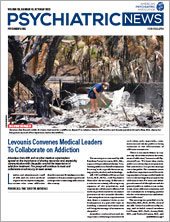While physicians are familiar with patient safety standards, quality of care, and accountability for their profession, they may be confused about the standards for nurse practitioners. This is, in part, due to obfuscating messages that physicians receive about nurse practitioners.
Nurse practitioners say that they provide services that are equivalent to those provided by physicians. Some also say that nurse practitioners are different from physicians and that physicians should not be permitted to conduct peer review about the care they provide. In psychiatry, these contentions are mutually exclusive, because there is one standard of care for psychiatric practice. Since many psychiatrists work or will work with psychiatric nurse practitioners, they should be cognizant of their scope of practice and, when appropriate, the nuts and bolts of a collaboration agreement. This article will briefly examine the duties of nurse practitioners in Canada before focusing on collaboration agreements with them in the United States.
The scope of practice for nurse practitioners in Canada varies by province and territory, according to the Canadian Institute for Health Information. Quebec is the only province that restricts how practitioners conduct advanced assessments, diagnose and manage patients, and prescribe controlled substances. Also, most provinces and territories grant nurse practitioners restricted or full hospital admitting privileges. Note that psychiatry is different. For example, most provinces and territories restrict or prohibit nurse practitioners from involuntarily hospitalizing patients.
In the United States, 27 states allow nurse practitioners to practice independently—that is, without physician supervision—although some states require a stepwise progression toward independent practice. The remaining states require nurse practitioners to maintain a written agreement with each collaborating physician that must be filed with the state nursing board. Collaboration agreements are time limited and must include conditions for terminating the agreement and the minimum accepted statutory requirements. For example, in some states, collaborating physicians must have the final say when disputes arise between the parties; in states where this is not a requirement, psychiatrists may decide to include it in the contract.
Some states restrict the independence of collaborating nurse practitioners more than others. For example, Ohio allows collaborating nurse practitioners to practice independently as long as they are able to consult with the collaborating physician when needed (see
Rule 4723-8-04 | Standard care arrangement for a certified nurse-midwife, certified nurse practitioner, and clinical nurse specialist.) In contrast, Missouri requires collaborating physicians to have a supervisory role. The physician must ensure that tasks delegated to collaborating nurse practitioners do not exceed their skill, education, training, and competence (see
Mo. Code Regs. tit. 20 § 2150-5.100). They are limited to implementing treatment methods that have been mutually agreed upon with the collaborating physician, who must be available for consultation. Also, collaborating physicians must review documentation of at least 10% of the services provided by collaborating nurse practitioners, who must submit the documentation within 14 days. Also, a state may require physicians to be on site or in close geographic proximity when collaborating nurse practitioners are on duty.
Collaborating with a psychiatric-mental health nurse practitioner can be rewarding, especially when the psychiatrist is involved in recruiting the nurse and crafting the collaboration agreement; this leads to a mutual understanding of expectations before patient care begins. Some psychiatrists are required to collaborate with whoever is assigned to them as a condition of their employment. This can be stressful when the two parties disagree, especially since the clinical care provided by each practitioner is monitored by a different regulatory board.
Health professions boards exist to protect the public by restricting each licensee’s scope of practice to procedures in which they are trained and credentialed to perform. Professional liability insurance companies do not indemnify health care professionals beyond their scope of practice and can restrict coverage within that scope. Although most clinicians understand this, psychiatrists should be cognizant of the scope of practice for nurse practitioners with whom they collaborate.
Roughly
88% of nurse practitioners are certified in primary care specialties, according to the American Association of Nurse Practitioners. Psychiatrists should restrict their collaboration agreements to the 6.5% of nurse practitioners who are board certified in (adult) psychiatric-mental health.
Although family nurse practitioners may obtain adult psychiatric-mental health subspecialty certification, there is no child and adolescent psychiatry training program or credential for nurse practitioners. This makes sense, because child and adolescent psychiatry is the only clinical fellowship in psychiatry that takes two years to complete; thus, psychiatric-mental health nurse practitioners would need additional training as well. Training in other specialties can be completed in one year.
Unfortunately, a few psychiatric-mental health nurse practitioners disregard scope of practice regulations. For example, some exclusively identify as “child and adolescent psychiatric-mental health nurse practitioners.” Several have told me that they were pediatric registered nurses before they obtained the psychiatric-mental health nurse practitioner certification and that such experience is sufficient. Also, in my forensic practice, I’ve come across a few nurse practitioners who identify as psychiatric-mental health nurse practitioners but have not completed the requisite training. Psychiatrists must verify a psychiatric-mental health nurse practitioner’s credentials and licensure status before initiating a collaboration agreement.
Although collaboration agreements should list the minimal statutory requirements, psychiatrists may opt to include additional considerations. For example, collaborating psychiatric-mental health nurse practitioners can be required to disclose their role and credentials to every patient as this is consistent with ethical standards. California restricts clinicians from introducing themselves as “doctor,” including doctoral-level nurse practitioners, unless they are physicians. A nurse who often introduced herself as a nurse practitioner but repeatedly advertised her services as a doctor was fined almost
$20,000 by a California judge, according to a report in the November 2022
Medical Economics.
Some collaboration agreements specify which patients (shared or independent) and the diagnoses that can be treated; the types of medications (for example, scheduled medications) that can be prescribed; coverage for evenings, holidays, emergencies, and weekends for both parties; and whether supervision or consultation is required. Consultation permits psychiatric-mental health nurse practitioners to practice independently; in theory, this shields psychiatrists from liability, but they can still be named as a party in a lawsuit. Also, when psychiatrists learn that an independent psychiatric-mental health nurse practitioner is engaging in unethical or unsafe practice, they must respond appropriately. It may involve remediation, reporting the individual to the nursing board, and/or terminating the collaborative relationship.
A
table produced by the AMA summarizes state laws regarding regulating the practice of nurse practitioners. While the table does not address matters that are specific to psychiatrists, it does provide useful information.
Also, many states have collaborating agreement templates that can be found on the internet. As always, psychiatrists should seek legal guidance and consult with a professional liability insurance agent before signing collaborative agreements with psychiatric-mental health nurse practitioners. ■


